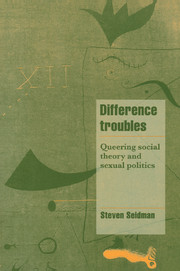Book contents
- Frontmatter
- Contents
- Preface
- Acknowledgements
- Introduction: the contemporary reconfiguring of social theory
- Part I Resisting difference: the malaise of the human sciences
- 1 The political unconscious of the human sciences
- 2 The end of sociological theory
- 3 Relativizing sociology: the challenge of cultural studies
- 4 The refusal of sexual difference: queering sociology
- 5 Difference troubles: the flight of sociology from “otherness”
- Part II Engaging difference: from lesbian and gay studies to queer theory
- Part III Democratic prospects: the politics of knowledge and identity
- Epilogue: pragmatism, difference and a culture of strong democracy
- Notes
- References
- Index
3 - Relativizing sociology: the challenge of cultural studies
from Part I - Resisting difference: the malaise of the human sciences
Published online by Cambridge University Press: 05 October 2010
- Frontmatter
- Contents
- Preface
- Acknowledgements
- Introduction: the contemporary reconfiguring of social theory
- Part I Resisting difference: the malaise of the human sciences
- 1 The political unconscious of the human sciences
- 2 The end of sociological theory
- 3 Relativizing sociology: the challenge of cultural studies
- 4 The refusal of sexual difference: queering sociology
- 5 Difference troubles: the flight of sociology from “otherness”
- Part II Engaging difference: from lesbian and gay studies to queer theory
- Part III Democratic prospects: the politics of knowledge and identity
- Epilogue: pragmatism, difference and a culture of strong democracy
- Notes
- References
- Index
Summary
The relationship between sociology and cultural studies resists a simple or global description, whether it be one of antagonism or kinship. Nevertheless, I wish to emphasize the ways the latter challenges the former. I intend to do this for the purpose of relativizing sociology as a discourse of “the social.” Approaching sociology as a local practice, viewing its conceptual strategies and thematic perspectives as indicative of a particular tradition rather than as a universal language of the social, is, I am wagering, useful in that it allows us to become aware of the singular discursive organization of sociology, for example, to have its disciplinary silences and conventions exposed. I am to induce a certain critical disengagement from the culture of sociology in order to imagine new disciplinary possibilities for social knowledge. Perhaps such a “therapeutic” exercise might permit us to project other ways we might wish to frame “the self” and “the social.” If the therapeutic model is to be believed, it is only by making us aware of unconscious compulsions and unnecessary constraints that change is possible.
I intend then to play off “cultural studies” against “sociology” not to suggest that the former is better in the sense of right or true. I do not believe this. I do believe though that in figuring sociology as a local, not a universal practice, in reading its discursive conventions as a tradition (or multiple traditions) not the very language of the social universe, we gain a critical attitude towards this discipline. I am of the opinion that critique and change is especially pressing at this juncture in sociology's disciplinary history.
- Type
- Chapter
- Information
- Difference TroublesQueering Social Theory and Sexual Politics, pp. 61 - 80Publisher: Cambridge University PressPrint publication year: 1997
- 3
- Cited by

